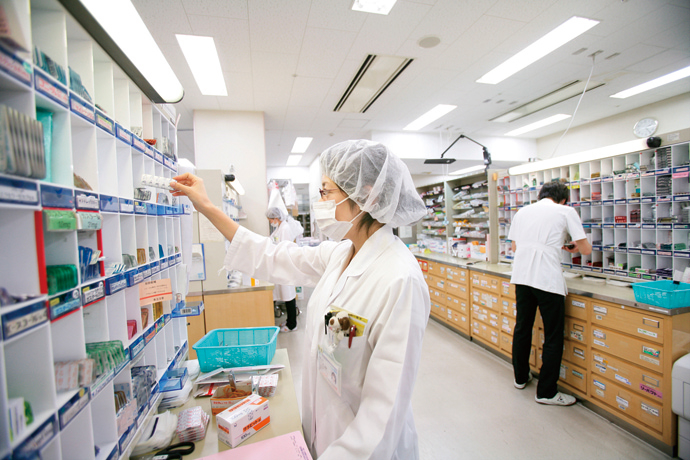Exploring the Diverse and Rewarding Careers in Pharmacy | Your Guide to Pharmacist, Technician, and More
Pharmacy is a multifaceted field that offers a variety of career paths, each with unique responsibilities and rewards. From traditional roles like pharmacists to emerging positions in healthcare technology and research, the pharmacy profession is integral to the healthcare system. This comprehensive guide will explore the diverse careers within pharmacy, including pharmacists, pharmacy technicians, and other specialized roles.
1. Pharmacist: The Cornerstone of Pharmacy
1.1 Role and Responsibilities
Pharmacists are healthcare professionals responsible for dispensing medications and advising patients on their use. They work closely with doctors and other healthcare providers to ensure patients receive the correct medications and understand how to use them effectively. Key responsibilities include:
- Medication Management: Pharmacists review and verify prescriptions, ensuring they are appropriate and safe for the patient.
- Patient Counseling: They guide how to take medications, potential side effects, and interactions with other drugs.
- Health Screenings: Pharmacists may conduct health screenings for conditions such as diabetes, hypertension, and cholesterol levels.
- Immunizations: Many pharmacists are certified to administer vaccines, contributing to public health efforts.
Discover Exciting Nursing Careers: From Registered Nurse to Nurse Anesthetist
1.2 Education and Training
To become a pharmacist, individuals must complete a Doctor of Pharmacy (Pharm.D.) degree, which typically takes four years after obtaining an undergraduate degree. The Pharm.D. program includes coursework in pharmacology, medical ethics, and clinical practice, as well as practical experience through internships.
1.3 Career Opportunities
Pharmacists can work in various settings, including:
- Retail Pharmacies: They work directly with the public, managing prescriptions and providing health advice.
- Hospitals: Hospital pharmacists collaborate with medical teams to manage medications for hospitalized patients.
- Clinical Settings: They may work in clinics or health centres, providing specialized medication management.
- Pharmaceutical Industry: Pharmacists can be involved in drug research, development, and marketing.
1.4 Rewards and Challenges
The profession offers substantial rewards, such as the satisfaction of helping patients improve their health and the opportunity to work in diverse environments. However, challenges include managing high-stress situations, long hours, and the need for ongoing education to stay current with medical advancements.

2. Pharmacy Technician: Support and Specialization
2.1 Role and Responsibilities
Pharmacy technicians support pharmacists by performing various tasks related to medication preparation and patient care. Their duties include:
- Prescription Processing: They assist in filling prescriptions, including measuring and labelling medications.
- Inventory Management: Technicians manage medication supplies, ensuring that stock levels are maintained and medications are stored properly.
- Patient Interaction: They may handle customer inquiries, provide medication information, and assist with insurance processing.
- Administrative Tasks: Pharmacy technicians often perform clerical duties, such as maintaining patient records and managing pharmacy billing.
2.2 Education and Training
Becoming a pharmacy technician typically requires a high school diploma or equivalent, followed by specialized training. Many technicians complete formal training programs or earn certification from organizations like the Pharmacy Technician Certification Board (PTCB). Certification is not always required but is highly recommended and can improve job prospects.
2.3 Career Opportunities
Pharmacy technicians find employment in various settings:
- Retail Pharmacies: They work alongside pharmacists to manage prescriptions and customer service.
- Hospitals: Technicians assist in preparing medications for inpatients and managing pharmacy operations.
- Long-Term Care Facilities: They help manage medications for residents in nursing homes or assisted living facilities.
- Speciality Pharmacies: Technicians in these settings focus on specific types of medications, such as those for rare diseases.
2.4 Rewards and Challenges
Pharmacy technicians enjoy a stable job market and opportunities for career advancement, such as becoming certified pharmacy technicians (CPhTs) or pursuing roles in pharmacy management. Challenges may include dealing with high-pressure environments and managing complex medication regimens.
Discover Exciting Nursing Careers: From Registered Nurse to Nurse Anesthetist
3. Clinical Pharmacist: Expertise in Patient Care
3.1 Role and Responsibilities
Clinical pharmacists are specialized pharmacists who work directly with healthcare teams to optimize medication therapy and improve patient outcomes. Their responsibilities include:
- Medication Therapy Management (MTM): Clinical pharmacists assess and manage patient medication regimens to ensure effectiveness and safety.
- Collaborative Practice: They work closely with physicians and other healthcare providers to develop and implement treatment plans.
- Patient Education: Clinical pharmacists provide detailed information on medication use and self-management techniques.
- Research and Development: They may be involved in clinical research to evaluate new therapies and improve treatment protocols.
3.2 Education and Training
Clinical pharmacists usually hold a Pharm.D. degree and have completed additional residency training or fellowship programs. Some may pursue board certification in specialities such as oncology, paediatrics, or cardiology.
3.3 Career Opportunities
Clinical pharmacists work in a variety of settings, including:
- Hospitals and Clinics: They play a critical role in managing complex patient cases and improving hospital care.
- Academic Institutions: Clinical pharmacists may teach and conduct research at universities.
- Research Organizations: They contribute to clinical trials and studies in pharmaceutical development.
3.4 Rewards and Challenges
The role of a clinical pharmacist offers the opportunity to make a significant impact on patient care and contribute to advancements in medicine. Challenges include the need for continuous education and the high demands of working with critically ill patients.
4. Pharmaceutical Industry Professional: Behind the Scenes
4.1 Role and Responsibilities
Pharmaceutical industry professionals work on various aspects of drug development, manufacturing, and marketing. Key roles include:
- Drug Development: Professionals in this area focus on researching and developing new medications, from initial discovery through clinical trials.
- Regulatory Affairs: They ensure that drugs meet regulatory standards and manage submissions to government agencies.
- Medical Affairs: This role involves providing scientific and medical information to support drug development and marketing.
- Pharmaceutical Sales: Sales representatives promote medications to healthcare providers and manage relationships with healthcare institutions.
4.2 Education and Training
Careers in the pharmaceutical industry typically require a background in pharmacy, science, or medicine. Advanced degrees, such as a Master’s in Pharmaceutical Sciences or an MBA with a focus on healthcare, can be advantageous.
4.3 Career Opportunities
Pharmaceutical industry professionals can work in:
- Research and Development (R&D): They contribute to creating new drugs and improving existing therapies.
- Regulatory Affairs: They handle the regulatory processes required for drug approval and compliance.
- Sales and Marketing: They develop strategies to promote and educate healthcare providers about new medications.
4.4 Rewards and Challenges
Working in the pharmaceutical industry offers the chance to be at the forefront of medical innovation and contribute to global health. Challenges include navigating complex regulatory environments and the pressure to meet development deadlines.
5. Academic and Research Careers in Pharmacy
5.1 Role and Responsibilities
Academic and research careers in pharmacy focus on advancing knowledge through teaching and research. Responsibilities include:
- Teaching: Educators train future pharmacists and pharmacy technicians through classroom instruction and practical training.
- Research: Academics research to advance pharmaceutical sciences and improve patient care.
- Publishing: They publish findings in scientific journals and present at conferences.
5.2 Education and Training
Academic careers typically require a Ph.D. or Pharm.D. with a strong research background. Teaching positions may also require experience in clinical practice or a track record of research achievements.
5.3 Career Opportunities
Academic and research professionals can work in:
- Universities: They teach and conduct research in academic institutions.
- Research Institutes: They focus on specialized research in pharmaceutical sciences.
- Government Agencies: They may work on public health research and policy development.
5.4 Rewards and Challenges
Academic and research careers offer the opportunity to shape the future of pharmacy and contribute to scientific advancements. Challenges include securing research funding and balancing teaching responsibilities with research.
Discover Exciting Nursing Careers: From Registered Nurse to Nurse Anesthetist
6. Specialized Pharmacy Roles
6.1 Compounding Pharmacist
Role and Responsibilities: Compounding pharmacists prepare personalized medications by combining or altering ingredients to meet specific patient needs. They work in settings such as compounding pharmacies and hospitals.
Education and Training: Compounding pharmacists usually have a Pharm.D. and may complete additional training in compounding techniques.
Career Opportunities: They can work in specialized compounding pharmacies, hospitals, and veterinary practices.
Rewards and Challenges: This role allows for creativity in medication preparation but requires precision and adherence to strict regulations.
6.2 Nuclear Pharmacist
Role and Responsibilities: Nuclear pharmacists prepare and dispense radioactive materials for diagnostic and therapeutic purposes. They work in nuclear medicine departments and specialized nuclear pharmacies.
Education and Training: This role requires a Pharm.D. and additional training in nuclear pharmacy.
Career Opportunities: They work in hospitals, research institutions, and nuclear pharmacies.
Rewards and Challenges: Nuclear pharmacists play a crucial role in advanced medical diagnostics but work with hazardous materials and require meticulous attention to safety.
6.3 Veterinary Pharmacist
Role and Responsibilities: Veterinary pharmacists specialize in medications for animals. They work with veterinarians to manage animal health and ensure proper medication use.
Education and Training: Veterinary pharmacists have a Pharm.D. and additional training or certification in veterinary pharmacy.
Career Opportunities: They can work in veterinary clinics, hospitals, and specialized veterinary pharmacies.
Rewards and Challenges: This role combines a passion for animals with pharmacy expertise, though it requires knowledge of animal physiology and medication.

The field of pharmacy offers a diverse array of career opportunities, each with unique responsibilities, rewards, and challenges. From traditional roles like pharmacists and pharmacy technicians to specialized positions in research, industry, and compounding, the pharmacy profession plays a vital role in healthcare. Whether you are interested in direct patient care, research, or industry, a career in pharmacy provides the chance to make a meaningful impact on health and well-being.





Post Comment